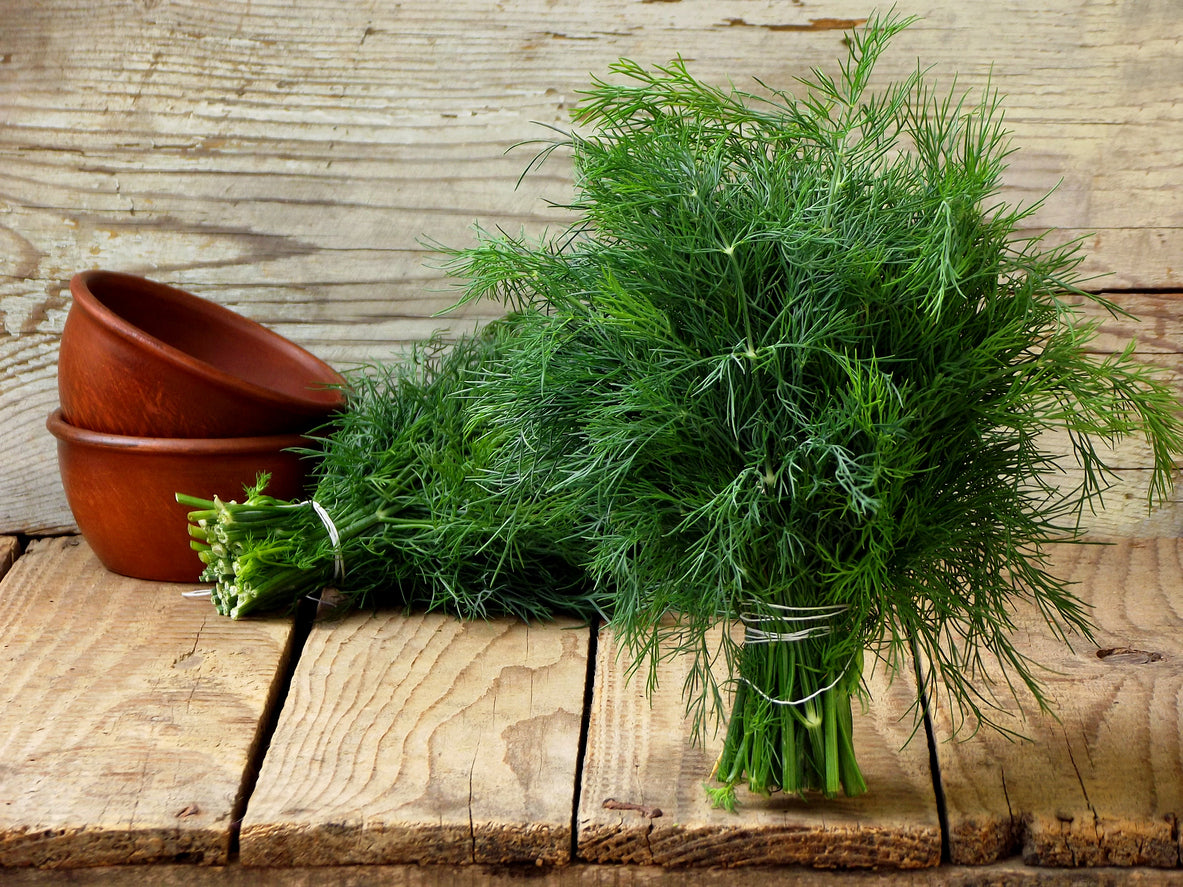Chill out with an herb that acts like a natural antidepressant

There is a lot more to dill weed than simply a flavoring for pickles. This feathery green herb is not only a versatile spice, garnish and seasoning, but has a long history as a medicinal plant, utilized by Ayurvedic healers to resolve digestive problems, high blood sugar, anxiety and stress. In addition, the oil made from dill seeds has even been used for aromatic purposes, and was reputedly burned as a sort of potpourri in ancient Greece.
Botanically known as Anethum graveolens, dill is a member of the Apiaceae family – and can claim healthy “superspices” like caraway, coriander, cilantro, anise, celery, parsley and fennel as its relatives. Research has shown that the seeds and the leaves of dill are rich in disease-fighting polyphenols, flavonoids and terpenes – the health benefits of which are currently being highlighted through scientific research. Preliminary studies support dill’s ability to lift mood and ease pain, thereby serving as a “natural antidepressant.”
Researchers compare the calming effects of dill to conventional Big Pharma products
Clearly, dill has a reputation for being able to calm nerves and promote restful sleep. By the way, the name “dill” comes from an ancient Norwegian word meaning “to soothe.”
Dill is particularly rich in quercetin, a flavonoid believed to have antidepressant effects. Dill also contains important fatty acids - such as petroselinic acid - which can help promote the activity of “feel-good’ neurotransmitters such as dopamine and serotonin.
In an animal study published in American Journal of Therapeutics, researchers found that dill extracts had significant antidepressant and pain-relieving properties. In fact, the team compared the effectiveness of dill to that of prescription medications such as sertraline (Zoloft) and tramadol (Ultram) – and added that the herb had no reported adverse effects. (It’s safe to say: Big Pharma probably doesn’t want that news getting out there!)
And, a relatively new (2020) study published in NeuroPharmacology Journal showed that dill extracts significantly diminished depressive symptoms in mice, and seemed to improve function and mood. The scientists declared that - while more study is needed - the results “support the traditional usage of dill in folk medicine. “
Health ALERT: Oxidative damage from free radicals is linked to depression
One of dill’s most important benefits is that it neutralizes harmful free radicals that cause oxidative stress and trigger disease. In addition to quercetin, dill contains the antioxidants isorhamnetin, limonene, carvone - which also supplies dill’s fragrance – and myristicin.
A laboratory study published in Journal of Herbal Pharmacotherapy compared the antioxidant effect of dill extracts to that of vitamin C – a powerful antioxidant in its own right. The scientists did this by calculating the amount needed for 50 percent scavenging of superoxide (free) radicals - and found that it only took 190 micrograms of dill extract to accomplish this, compared to 260 mcg of vitamin C. And, the amount needed to scavenge 50 percent inhibition of lipid peroxide was only 3,100 mcg with dill extracts, as opposed to 5,000 mcg for vitamin C.
This strong antioxidant effect of dill extract might explain its antidepressant properties. In a 2017 review, researchers pointed out the link between depression and oxidative stress. They added that quercetin may ease mood disorders by increasing neurotransmitters, such as norepinephrine, that appear to be inhibited by depression.
Dill offers up a jackpot of essential vitamins and minerals
Low calorie, fiber-rich and nutrient-dense, dill is truly a healthy spice. It is particularly high in vitamin A - needed for proper vision and immune health - with a 100-gram serving containing 154 percent of the RDI. The same serving of dill also offers 142 percent of the RDI for antioxidant vitamin C, and over a third of the RNI of folate, or vitamin B-9, which is vital for the production of red blood cells.
Dill is also a good source of calcium, with a single tablespoon providing close to 10 percent of the RDI. Manganese, potassium, iron and magnesium – which has mood-stabilizing properties – round out the healthy roster of essential minerals in dill.
Incorporate the piquant taste of dill in recipes for chicken, salmon plus much more
Dill has a delicate, sweet taste that can be compared to celery – but perhaps with a little more “tang” to it. This mild flavor makes it a natural accompaniment to fish, poultry, potatoes and creamy sauces, and helps it pair well with similar spices like tarragon and celery seed. You can also sprinkle fresh dill on mixed green salads, add it to salad dressings and dips and use it in marinades and stuffings.
Dill seeds, which have a rich taste reminiscent of caraway seeds, are at home in breads, crackers and – of course – dill pickles.
Fresh dill is generally available in summer and early fall, while dried dill may be purchased throughout the year. Naturally, opt for organic dill whenever possible.
To store dill, wrap in a paper towel after rinsing well, and place in an airtight bag in the refrigerator. While fresh dill should not be stored in the refrigerator for more than a few days, you can freeze it and store the frozen sprigs for up to six months.
So, whether you’re using it to flavor halibut, enhance a salad dressing or enliven a casserole, dill is both tasty and healthy ... a true win/win.






